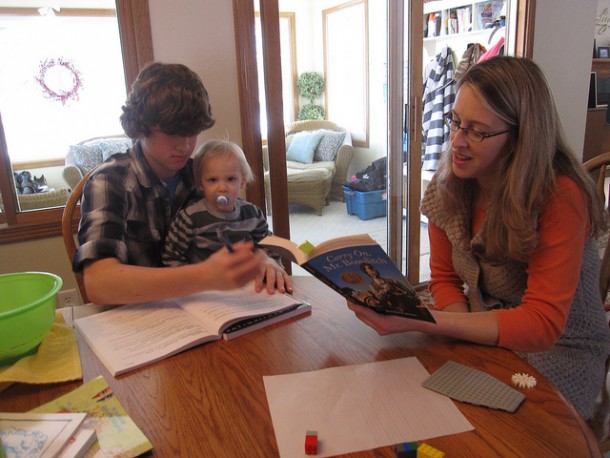[translations idioma=”ES” url=”https://archives.rgnn.org/2014/04/23/serie-educacion-educacion-en-familia/”]
Under the motto, “Education is the key,” ROOSTERGNN is publishing a Special Series dedicated exclusively to one of the most important topics defining our society of today: Education. View the complete series here.
SPAIN. The main people responsible for a child’s education are the parents. They are the ones that have to choose the school which will form the mind and awareness of their children. Faced with this decision, some prefer an alternative to school education – that of the family environment as a driving force behind their child’s academic and personal development.
In some cases it is a free choice that is expected, and in other cases parents who are unable to pay for private education take on the challenge of home education in order to offer their children an alternative system to one that is falling apart, in addition to addressing the deep moral crisis in society.
Although some parents may object to their children being evaluated, it is in the child’s best interests to have their progress assessed.
The minimum requirements that should be monitored are:
- That at least one of the parents attended higher education and can be at home with the children, and/or a tutor in possession of the required academic qualifications.
- To follow the curriculum established by the LOMC (Ley Orgánica para la Mejora de la Calidad Educativa – Spanish Organic Law for Improving the Quality of Education), but respecting the flexible and personalised method of homeschooling, in the same way that the principle of equality and quality of education for all children must be followed, but the doctrine of “specific treatment” must also be taken into account.
- To provide academic evaluations adhering to the new LOMCE system, which are given at each stage. In order that family life should not be disturbed by a home visit, the tests must be taken in either public or private school institutions, or via an official online application.
- In the case that the pupil does not meet the required standards, a certain time period must be granted in order to allow them to catch up, adhering to the idea of flexibility in the school career achieved by receiving help from a tutor or improvement programmes. These programmes can also be developed at home by the parents or by the tutor that has been hired. If the child does not meet the objectives, the parents or legal guardian must be granted the option of choosing between either: a) Taking part in tutorial and improvement programmes at a public or private school; b) Enrolling the child at school.
- There is a tendency to instil common values in Europe, which the Spanish education system is aiming towards, such as preparation for exercising citizenship. This would perhaps be the only subject that home-educated children would share in common with school-educated children, therefore covering what cannot be achieved in the same way as it is in school and creating a system which is similar to flex-schooling, albeit a limited version.
However, there will appear cases of indoctrination of ideologies that do not conform to the parents´ beliefs. Hence the need for private education, and the need to allow conscientious objection if indoctrination is proved, as stated by the Supreme Court in the Decree passed on the 28th of January 2009.
- To monitor the physical and psychological integrity of minors. School children are also exposed to abuse and not all Spanish households receive visits. That is why only one extra tutor at school, with regularly scheduled visits, is demanded, with the possibility of seeing a school psychologist if the tutor deems it to be necessary.
From a legal perspective, parents cannot be accused of abandoning their children, neither in terms of civil nor criminal law, as the most important factor of education is developing abilities and acquiring the skills necessary for learning, in addition to social interaction and non-academic activities. As the organiser of the third national conference on education within the family, and an expert on families that form the various associations in Spain, it can be said that children educated at home are usually higher achievers than the majority of children their age, they play sport with other children, and the majority take music lessons. Excellent academic results and high rates of university admissions have been acknowledged. Furthermore, one cannot dispute the socialisation of minors in more than thirty countries worldwide.
Homeschooling is a way of respecting intercultural diversity, and it is accepted as an alternative method of teaching. It does not claim to create social parallels based on different philosophical conceptions.
Nevertheless, the experience offered by schools in order to create a more pluralistic society, and despite the fact that this does have its virtues, does not eradicate all the difficulties, such as academic failure and school bullying.
— Translation: Deborah Raine.

